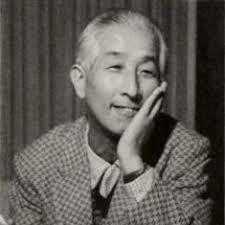Poet
Iku Takenaka

Iku Takenaka
(Japan, 1904 - 1982)
Biography
Iku Takenaka was quintessentially a city poet, the type of poet whose life and work are forever tied to a particular urban area. In his case, the city in question is Kobe, one of the largest ports in Japan, which has served since 1867 as a window to the outside world and a gateway to Western culture.World War II, however, changed his life dramatically. His big mansion in an affluent area of the Suma district of Kobe burned down in an air raid, and the 4,000 volumes in his private library all perished (see MY BOOKS).
In PASSED-ON FIRE he wrote:
The fire that lit this cigarette in my mouth
was passed on to me a while ago by a stranger on the street.
A strange fire.
A noble fire of aventurine color.
Anybody want this fire?
was passed on to me a while ago by a stranger on the street.
A strange fire.
A noble fire of aventurine color.
Anybody want this fire?
The poet, who had previously enjoyed financial stability and had even been given a private tennis court by his parents, now found himself with no income except from the work of his own penmanship. And he had five children to support. After his death, another Kobe poet, Toshikazu Yasumizu, found a notebook among Takenaka’s belongings. In it was a detailed list of the writing fees from various newspapers and publishers.
After the war, Takenaka shifted his focus to poetry for children and founded a children's poetry magazine, Kirin (Giraffe), which lasted for 220 issues over 23 years. Today in Kobe there are some who started writing poetry because of this magazine. With his own poems and those of the next generation, Iku Takenaka's contribution to poetry is still fresh in the port city.
© Yasuhiro Yotsumoto
PoetyKumabachi to kahun (Bumble Bees and Pollen) Kobe, Kaikō Shijn Kurabu 1926
Eda no shukujitsu (Holiday of a Bough) Kobe, Kaikō Shijn Kurabu 1928
Hitosaji no Kumo (A Spoonful of Cloud), Bon Shoten 1932
Zōge kaigan (Ivory Coast) Tokyo, Daiichi Shobō 1932
Ryūkotsu (Dragon Bones) 1944
Dōbutsu Jiki (Beastly Magnetism) Tokyo/Osaka, Ozaki Shobō 1948
Sonohoka (Anything Else) 1968
Polka-mazurka, Chōryūsha,1979
Takenaka Iku Shishū (Collected Poems) Tokyo, Shichōsha 1994
Takenaka Iku Shishūsei (Complete Poems) Tokyo, Chūsekisha 2004
Essay
Pari no tegami (Paris Letters), Osaka, Henshūkōbō Noah, 1986
Poems
Poems of Iku Takenaka
Sponsors
























